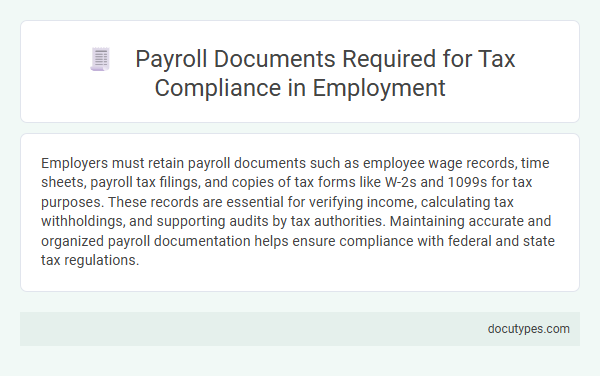Employers must retain payroll documents such as employee wage records, time sheets, payroll tax filings, and copies of tax forms like W-2s and 1099s for tax purposes. These records are essential for verifying income, calculating tax withholdings, and supporting audits by tax authorities. Maintaining accurate and organized payroll documentation helps ensure compliance with federal and state tax regulations.
Introduction to Payroll Tax Compliance
Payroll tax compliance requires careful management of specific documents to meet legal obligations. Employers must retain detailed payroll records to accurately report income, tax withholdings, and contributions. Understanding which payroll documents are essential for tax purposes helps ensure your business stays compliant with government regulations.
Essential Payroll Documents Overview
| Payroll Document | Description | Retention Period |
|---|---|---|
| W-4 Forms | Employee's withholding allowance certificate used to determine tax withholdings | Retain for at least 4 years after the tax year to which they relate |
| Payroll Registers | Detailed records of employee wages, hours worked, and payroll deductions | Keep for a minimum of 4 years |
| Tax Filing Reports | Includes forms such as 941 (Employer's Quarterly Federal Tax Return) and state tax filings | Maintain for at least 4 years |
| Employee Earnings Records | Summary of wages paid, taxes withheld, and benefits provided | Required to be kept for at least 4 years after the end of the tax year |
| Time Sheets and Attendance Records | Documentation of hours worked, overtime, and leave taken by employees | Retain for at least 3 years |
| Form W-2 Copies | Annual wage and tax statement provided to employees and the IRS | Keep copies for a minimum of 4 years |
| Benefits and Retirement Plan Records | Records related to employee benefit elections and contributions | Retain according to plan requirements, generally 6 years |
You must ensure these essential payroll documents are securely retained to comply with tax regulations and facilitate accurate reporting during audits.
Employee Identification and Tax Forms
What payroll documents must be retained for tax purposes regarding employee identification and tax forms? Employers are required to keep employee identification forms such as Form W-4, which details federal income tax withholding information. Maintaining accurate tax records ensures compliance with IRS regulations and facilitates accurate tax reporting.
Wage and Hour Records
Payroll documents related to wage and hour records must be retained for accurate tax reporting and compliance. Proper maintenance of these records helps in addressing potential audits and wage disputes effectively.
- Time Sheets and Attendance Records - These documents track hours worked by employees, essential for calculating wages and overtime.
- Wage Rate Information - Records of employee pay rates ensure correct wage calculations and support minimum wage compliance.
- Payroll Registers - Comprehensive summaries of payroll transactions provide detailed information for tax filings and labor law audits.
Payroll Register Documentation
Payroll register documentation is a critical payroll document that must be retained for tax purposes. It contains detailed records of employee wages, tax withholdings, and other deductions.
- Payroll Register Overview - This document summarizes each payroll period's gross pay, net pay, and tax withholdings for all employees.
- Tax Compliance - Maintaining accurate payroll registers ensures compliance with IRS and state tax regulations by providing proof of salary and tax reporting.
- Retention Period - Payroll registers should be kept for at least four years as recommended by the IRS for audit and verification purposes.
You should ensure payroll register documentation is securely stored and easily accessible in case of an audit or tax inquiry.
Tax Withholding Certificates
Tax withholding certificates, such as the IRS Form W-4, are essential payroll documents that employers must retain for tax purposes. These certificates provide critical information on employee tax withholding allowances and filing status.
Maintaining accurate records of tax withholding certificates ensures compliance with federal and state tax regulations. Employers are typically required to keep these documents for at least four years to support tax reporting and audits.
Employer Tax Filings and Reports
Employers must retain payroll documents such as Form W-2, Form 941, and payroll tax returns to ensure compliance with tax regulations. These records support accurate employer tax filings and reports required by the IRS and state tax agencies. Maintaining these documents is essential for resolving any disputes or audits concerning employee tax withholdings and contributions.
Payroll Deductions and Benefits Records
Employers must retain payroll deductions and benefits records for tax purposes to ensure compliance with federal and state regulations. These documents include records of taxes withheld, retirement contributions, health insurance premiums, and other employee benefit deductions.
Maintaining accurate payroll deduction records allows employers to verify that the correct amounts have been withheld and reported to tax authorities. Benefits records provide proof of employer contributions and employee eligibility for various programs. Proper documentation supports audit readiness and protects against potential disputes or penalties.
Year-End Payroll Documentation
Year-end payroll documentation is critical for accurate tax reporting and compliance. Employers must retain W-2 forms, which summarize annual wages and tax withholdings for each employee.
Alongside W-2s, employers should keep copies of W-3 transmittal forms submitted to the Social Security Administration. Maintaining payroll registers, tax deposit receipts, and year-end summaries ensures proper record-keeping for audits.
What Payroll Documents Must Be Retained for Tax Purposes? Infographic

